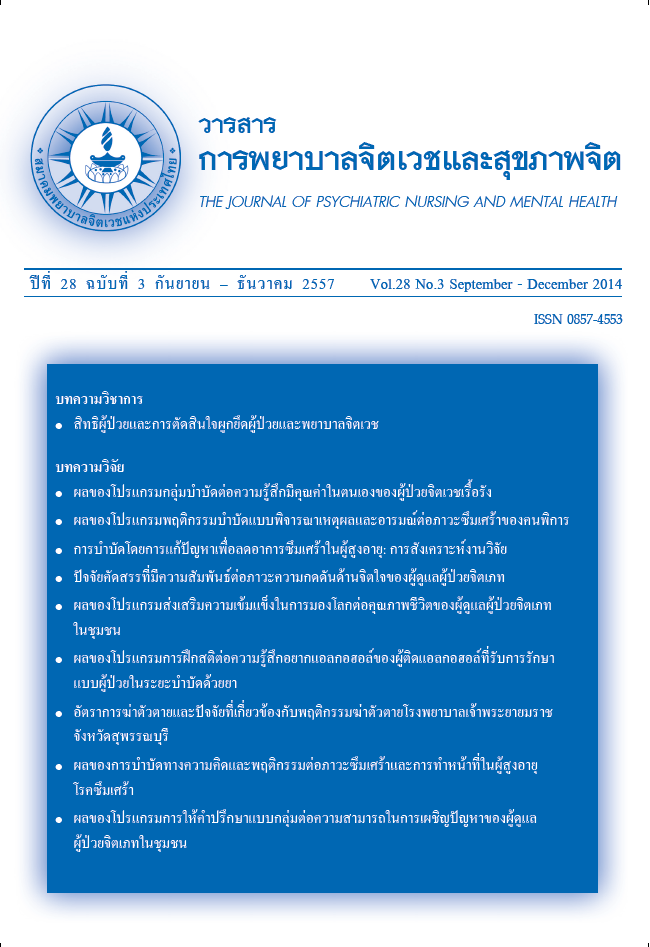ผลของโปรแกรมการฝึกสติต่อความรู้สึกอยากแอลกอฮอล์ของผู้ติดแอลกอฮอล์ที่รับการรักษาแบบผู้ป่วยในระยะบำบัดด้วยยา EFFECT OF MINDFULNESS TRAINING PROGRAM ON ALCOHOLCRAVING OF INPATIENT ALCOHOL DEPENDENCES RECEVINGDETOXIFICATION TREATMENT
Main Article Content
บทคัดย่อ
วัตถุประสงค์: การวิจัยครั้งนี้มีวัตถุประสงค์เพื่อเปรียบเทียบ 1) คะแนนความรู้สึกอยากแอลกอฮอล์ก่อนและหลังการทดลอง ของผู้ติดแอลกอฮอล์ ในกลุ่มทดลองที่ได้รับโปรแกรมการฝึกสติและกลุ่มควบคุมที่ได้รับการบำบัดรักษาตามปกติ 2) ความแตกต่างของคะแนนความรู้สึกอยากแอลกอฮอล์ก่อนและหลังการทดลอง ของผู้ติดแอลกอฮอล์ ระหว่างกลุ่มที่ได้รับโปรแกรมการฝึกสติ กับกลุ่มที่ได้รับการบำบัดรักษาตามปกติ
วิธีการศึกษา: เป็นการวิจัยกึ่งทดลองแบบสองกลุ่มวัดก่อนและหลังการทดลองกลุ่มตัวอย่างจำนวน 46 ราย ได้จากการวิเคราะห์ power analysis of sample size เป็นผู้ติดแอลกอฮอล์เพศชายที่รับการรักษาแบบผู้ป่วยใน ระยะบำบัดด้วยยาสถาบันธัญญารักษ์จังหวัดปทุมธานี ซึ่งมีคุณสมบัติตามเกณฑ์ ได้รับการจับคู่ด้วยคะแนนความรู้สึกอยากแอลกอฮอล์ และจำนวนครั้งที่เข้ารับการบำบัด แล้วถูกสุ่มเข้ากลุ่มทดลองและกลุ่มควบคุม กลุ่มละ 23 ราย เครื่องมือที่ใช้ในการวิจัยคือ 1) โปรแกรมการฝึกสติ 2) แบบประเมินความรู้สึกอยากแอลกอฮอล์ (Alcohol Craving Questionnaire-Revised: ACQ-R) 3) แบบประเมินทางพุทธิปัญญาและความมีสติ (Cognitive and Affective Mindfulness Scale-Revised: CAMS-R) 4) แบบสอบถามข้อมูลประชากร เครื่องมือทุกชุดผ่านการตรวจความตรงเชิงเนื้อหาจากผู้ทรงคุณวุฒิจำนวน 5 ท่าน เครื่องมือชุดที่ 2 และ 3 มีค่าความเที่ยงอัลฟาของ ครอนบาค เท่ากับ .96 และ .74 ตามลำดับ วิเคราะห์ข้อมูลโดยใช้สถิติทดสอบที
ผลการศึกษา: ผลการวิจัยสรุปได้ดังนี้ 1) คะแนนเฉลี่ยความรู้สึกอยากแอลกอฮอล์ก่อนและหลังการทดลอง ของผู้ติดแอลกอฮอล์ที่รับการรักษาแบบผู้ป่วยใน ระยะบำบัดด้วยยา ในกลุ่มทดลองที่ได้รับโปรแกรมการฝึกสติและกลุ่มควบคุมที่ได้รับการบำบัดรักษาตามปกติ มีความแตกต่างกันอย่างมีนัยสำคัญทางสถิติที่ระดับ .05 2) ผลต่างคะแนนเฉลี่ยของความรู้สึกอยากแอลกอฮอล์ของผู้ติดแอลกอฮอล์ที่รับการรักษาแบบผู้ป่วยใน ระยะบำบัดด้วยยา ในกลุ่มทดลองมีความแตกต่างจากกลุ่มควบคุม อย่างมีนัยสำคัญทางสถิติที่ระดับ .05
Objectives: The objectives of this research were to compare: 1) the pretest and posttest alcohol craving scores of alcohol dependences in the study group who received mindfulness training program and those in the control group who received regular treatment, and 2) the pretest - posttest differential alcohol craving score between the study group and the control group.
Methods: This study was a quasi- experimental pretest - posttest control groups design. A total sample size of 46 subjects, calculated using power analysis of sample size, were male inpatient alcohol dependences receiving detoxification treatment in Thanyarak Institute, Pathumthani Province who met the inclusion criteria .They were matched - pair by craving score and times for treatment and then randomly assigned to experiment or control group, 23 subjects in each group. Research instruments comprised of: 1) Mindfulness Training Program, 2) Alcohol Craving Questionnaire-Revised (ACQ-R), 3) Cognitive and Affective Mindfulness Scale-Revised (CAMS-R), and 4) Demographics Data Form. The content validity of all instruments had verified by 5 professional experts. The 2nd and 3rd instrument had Cronbach’s Alpha Coefficient reliability of .96 and .74 respectively. Descriptive statistics and the t-test were used in data analysis.
Results: The results were as follows: 1) The mean scores of alcohol craving in theexperimental and control group before and afterreceiving mindfulness training program had significant difference at .05 2) The pretest - posttest differential score of alcohol craving between the experimental group and the control group had significant difference at .05
Article Details
บทความที่ได้รับการตีพิมพ์แล้ว เป็นลิขสิทธิ์ของสมาคมพยาบาลจิตเวชแห่งประเทศไทย


